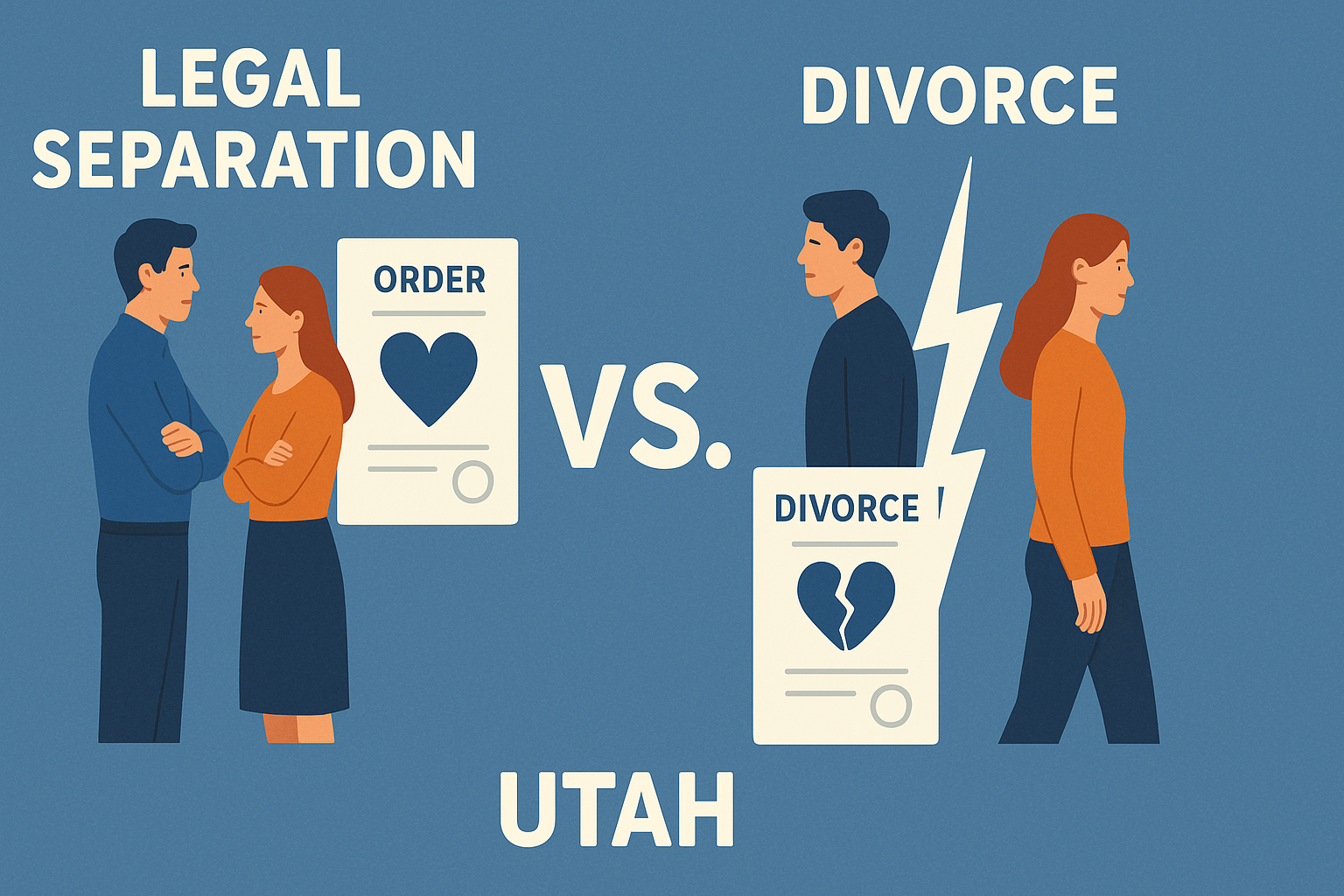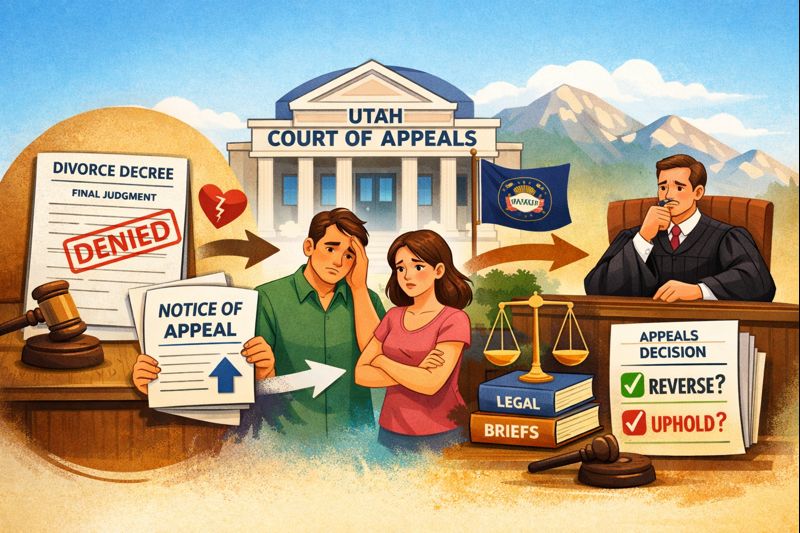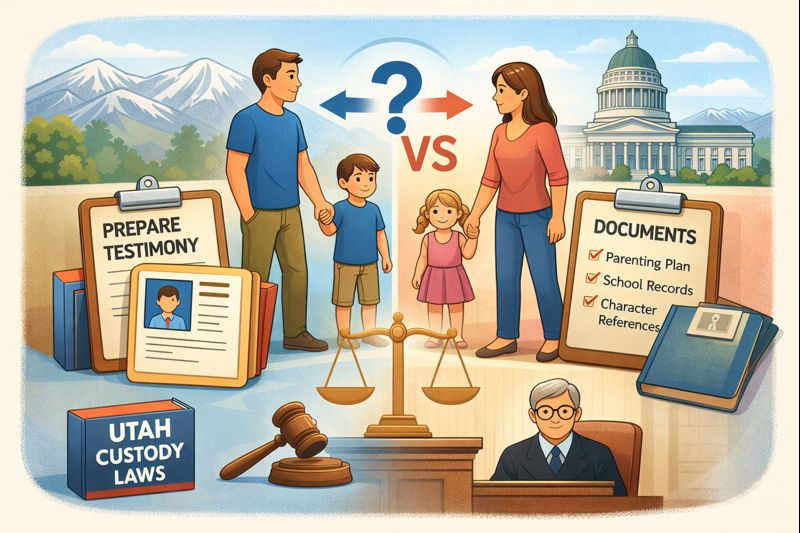Legal separation and divorce often get grouped together, but in Utah they serve different purposes and lead to very different outcomes. Many couples begin by asking the same question: Do we end the marriage, or do we separate legally while staying married on paper?
This guide explains how Utah law treats both options so individuals and families can understand the requirements, legal effects, and long-term consequences before filing anything with the court.
Introduction: What Is the Difference in Utah?
In Utah, divorce ends a marriage permanently, while legal separation (also called “separate maintenance”) keeps spouses legally married but resolves most of the same issues a divorce would. Couples often consider legal separation when they want structure, protection, and financial orders but are not prepared emotionally, financially, or religiously for a full divorce.
To help illustrate the distinction, the following video provides a concise introduction to how separation keeps you legally married while divorce terminates the marriage:
Watch: What Is the Difference Between Legal Separation and Divorce?
Overview: How Utah Courts Handle Legal Separation vs Divorce
Both legal separation and divorce fall under the umbrella of Utah family law, and both involve court orders that address finances, children, and property. However, the purposes and long-term effects differ. Legal separation allows spouses to stay married on paper while putting clear rules in place, while divorce permanently dissolves the marriage.
A Utah-specific video below explains how people in Utah decide between the two and highlights considerations such as finances, religious preferences, and potential reconciliation:
Watch: Divorce or Legal Separation? Which Is Best for Me?
Key Definitions and the Utah Statutes That Apply
Legal Separation (Separate Maintenance): Utah allows spouses to request “separate maintenance” under Utah Code § 30-3-3. A legal separation does not dissolve the marriage. Instead, the court issues orders about child custody and parent-time, child support, alimony, division of living expenses, and temporary property arrangements. Spouses remain legally married, which means neither person can remarry, and certain benefits, like health insurance, may stay active depending on the provider’s rules.
Divorce: A divorce in Utah dissolves a marriage permanently. Court orders issued in a divorce cover custody and parent-time, child support, alimony, property and debt division, and final termination of the marital relationship. Once the divorce decree is entered, the parties are no longer married and can remarry.
Typical Court Procedures in Utah
Although the processes overlap, the purpose of each filing changes the overall direction of the case. Both paths require formal paperwork, financial disclosures, and court-approved orders, but the end result is either a continued marriage with structured rules or a final divorce decree.
Legal Separation Process (Separate Maintenance)
Petition for Separate Maintenance
One spouse files a Petition for Separate Maintenance with the court to request legal separation orders.
Response from the Other Spouse
The responding spouse answers the petition, either agreeing, disputing, or requesting different terms.
Temporary Orders
The court may issue temporary orders early on to address custody, support, and living arrangements while the case is pending.
Financial Disclosures
Both spouses exchange financial disclosures so the court has accurate information about income, assets, and debts.
Negotiation and Orders
Custody, support, and financial issues are addressed similarly to a divorce, through agreement or court decision.
Final Separate-Maintenance Order
The court issues a final separate-maintenance order that sets out the long-term terms while the spouses remain married.
Divorce Process
Petition for Divorce
One spouse files a Petition for Divorce with the court to begin the divorce case.
Waiting Period
In most cases, a mandatory 30-day waiting period applies between filing and finalization, unless waived for good cause.
Mediation Requirement
Utah typically requires mediation before a judge will move a contested divorce toward trial, giving spouses a chance to resolve disputes.
Disclosures and Custody Information
Parties exchange detailed financial and custody information so the court can evaluate support, property division, and child-related issues.
Agreement or Trial
Agreements may resolve the case by stipulation. If not, a judge decides remaining issues at trial and issues orders.
Final Divorce Decree
A final divorce decree is entered, permanently ending the marriage and finalizing property, custody, and support terms.
An Instagram video below provides helpful context on how these cases, especially divorce cases, affect families and why the process matters:
Required Forms and Filings in Utah
The required forms differ depending on whether you are seeking legal separation or divorce, but both paths involve detailed paperwork and strict procedural rules.
Forms for Legal Separation (Separate Maintenance)
Petition for Separate Maintenance to request legal separation orders.
Financial Declaration outlining income, expenses, assets, and debts.
Child-related forms if children are involved, including custody and support information.
Proposed parenting plan when ongoing custody and parent-time need to be structured.
Proposed separate-maintenance order for the judge to enter as the final order.
Forms for Divorce
Petition for Divorce and accompanying Summons.
Financial Declaration for each spouse.
Child-related affidavits and worksheets when minor children are involved.
Parenting plan that sets out custody schedules and decision-making.
Child support worksheet using Utah’s guidelines and calculator.
Divorce decree drafted for the judge to sign, reflecting the agreed or ordered terms.
Utah has strict procedural rules, and incorrect or incomplete filings can delay the case significantly, regardless of whether you pursue legal separation or divorce.
The following Instagram reel addresses a common legal-process question: whether a spouse can stop the divorce once it begins. It helps illustrate how Utah courts view the process:
Common Mistakes to Avoid
Assuming separation is faster or easier: Legal separation can take just as long as a divorce, especially when finances or parenting plans are disputed.
Believing separation prevents future divorce: A legal separation can later be converted into a divorce. It does not lock in long-term outcomes or guarantee reconciliation.
Overlooking insurance and financial implications: Some couples pursue separation to maintain insurance or tax advantages, but these benefits depend on third-party rules, not the court’s orders.
Not planning for long-term property division: In a separation, the marriage continues. Long-term assets, like retirement accounts, may keep growing jointly unless addressed clearly in the court order.
Filing without understanding Utah’s specific legal requirements: Missing forms, incomplete disclosures, or unclear terms can prolong both separation and divorce cases.
Next Steps: How to Decide What Is Right for You
Choosing between legal separation and divorce in Utah depends on your goals, beliefs, and long-term plans. Both are serious legal steps, and each can affect finances, custody, and future options in different ways.
When Legal Separation May Be Appropriate
You or your spouse are considering reconciliation and want time with clear rules in place.
Religious or personal beliefs discourage divorce, but you still need legal and financial protections.
Insurance access or financial stability is a major concern, and remaining married may preserve certain benefits, subject to third-party rules.
You need court-ordered custody, support, or safety measures but are not yet ready to end the marriage.
When Divorce May Be Appropriate
Reconciliation is unlikely and you want closure and a permanent resolution.
You prefer a complete financial and legal separation, including final property and debt division.
You want the ability to remarry in the future once the divorce is final.
A Utah family-law attorney can help evaluate the legal, financial, and long-term consequences of each choice based on your specific situation.
Conclusion: Stay Informed and Get the Right Guidance
Legal separation and divorce are both significant legal steps in Utah, but they serve different needs. Understanding how each process works and how Utah courts view custody, support, and financial orders helps families make decisions with clarity rather than uncertainty.
Gibb Law Firm assists clients throughout Utah in understanding the options available, preparing the correct documents, and choosing the path that best supports long-term stability. If you have questions about which option is right for your family, scheduling a consultation can help you take the next informed step.
Talk to Gibb Law Firm About Legal Separation vs Divorce in Utah
Have questions about whether legal separation or divorce fits your situation, what forms you need, or how to protect your finances and your children? Our family law team can help you understand your options, avoid common mistakes, and move forward with confidence.
Schedule a Consultation


